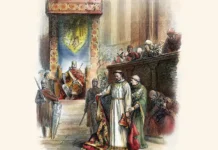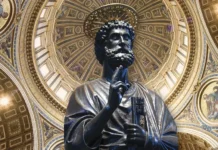How long did the Magisterium take to define the Immaculate Conception of Mary? Nineteen centuries, even though the entire Church clamoured that the declaration be made long before this. Is not something analogous taking place with St. Joseph?
When God formed Adam from clay, He did not want him to remain alone, but gave him the companionship of Eve; thus, in His “image and likeness […], male and female He created them” (Gn 1:26-27). Likewise, upon conceiving the plan of redemption and endowing His Son with the best of mothers, it did not seem right that She remain alone; He therefore ordained to place at her service a strong and chaste man who would protect and reverence Her.
But who would be proportionate to Her who most perfectly reflects the grandeur of God? What creature would have sufficient majesty to be the spouse of the Queen of Heaven and earth? How to find someone with a certain approximation to the Lady whom God would call Mother?
From all eternity, the Divine Artisan prepared a man, whose incomparable gifts and privileges could be summed up in two sublime titles: virginal father of Jesus and spouse of the Virgin Mary!1

Exempt from sin since conception
In order to appreciate the moral stature of St. Joseph, we must begin by considering the sanctity of those with whom he would live in a setting as intimate as that of a family.
In the first place, we must consider the perfection of Mary.
It is important to have a notion of Our Lady’s degree of purity in order to fathom the extent to which the man chosen to be her alter ego – other I – was gifted by the Holy Spirit with a heart that was pure beyond all imagination.
In view of the Divine Maternity and the co-redemptive mission of Mary, Providence applied the merits of the most precious Blood of Christ to her benefit, in a sui generis and excelling manner. Our Lady, in anticipation of the future Passion and Death of Jesus, was sanctified from the first instant of her conception, being not only free from original sin and all of its consequences, but also being endowed with a plenitude of grace that would only increase throughout her life.
In Her, there was not the least trace of an inclination to concupiscence; on the contrary, her soul maintained complete harmony, ever submissive to the will of God through correspondence to all the motions of grace. Her passions were subordinated to reason, illuminated by faith. Consequently, She was a virginal creature, endowed with the gift of a super-excellent uprightness, entirely directed toward the most sublime perfection.
St. Joseph would be united to Her by the most intimate of natural bonds: matrimony.
Espoused to an angelic man
The friendship between spouses is such that St. Thomas2 affirms that the indivisible union of spirits is the essence of marriage. Life under the same roof, the frequent interaction and the familiarity filled with reverence and respect that existed between Joseph and Mary prompt a decisive question: would it be possible for the man destined to be inseparably united in marriage to the Immaculate Virgin be victim of the effects of original sin? Not only from the standpoint of preserving Our Lady from risk incurred by proximity to a husband subject to the corruption of concupiscence, but for an even higher reason.
Our Lady is “the earthly Paradise of Jesus Christ, the new Adam,”3 as the great French theologian St. Louis-Marie Grignion de Montfort affirms. If in the garden of Eden, created for men, God introduced only persons without sin and did not permit them to remain there after they had offended His infinite majesty, how can we imagine that he whom God had predestined to be the guardian of His paradise, far more beautiful and sublime than the terrestrial one, and to be one with Her, would be marred by the consequences of original sin?
How would Our Lady feel if she lived day and night with a man inclined to baseness by concupiscence? Could She comprehend that God had preserved Her from all the contagion of sin only to join Her in matrimony to someone stained with the sin of Adam? In sum, if the guardianship of terrestrial paradise was, after the sin, entrusted to the Angels alone, it was only be fitting that Our Lady be espoused to an angelic man.4
In this way, the moral stature of St. Joseph can be measured by the grandeur of Our Lady. If her sanctity is sublime and incalculable, so must his be, albeit to a lesser degree, because God chose him to be united with Her in marriage and together to form one spirit. Added to this is the fact of his being the first Marian devotee and, consequently, the one who benefitted most from her universal mediation.
Necessary collaborator in the hypostatic union

Museum of San Marco, Florence (Italy)
Added to this is St. Joseph’s predestination to have, with regard to the Son of God, the affection and responsibilities of a true father, even though he had not cooperated in procreation.
He will shine before Heaven, the Angels and the just of all time as the father of Our Lord Jesus Christ. Would it make sense that the one chosen to educate, guide and protect the Word Incarnate be a common man, marked by the disorder resulting from the sin of our first parents?
This is heighted by the fact that God created St. Joseph in view of his sublime mission. Since Our Lady was immaculate due to her intimate association with the mystery of the Incarnation of the Word,5 why would he not enjoy a similar privilege? If in anticipation of the merits of the Passion of the Son, the Mother of God was preserved from the stain of sin, can it not be said, also in light of the spotless purity of Mary, that Joseph was exempt from original sin and its consequences, as well as full of grace in proportion with his extraordinary vocation?
On account of his ministry, St. Joseph was ordained to collaborate in a necessary manner in the realization of the plan of the hypostatic union.6 The Son of God wished to be born of Mary by a miracle of the Holy Spirit, but He chose for Himself a well-constituted family. Given that the husband is the head of the wife, and the Creator respects the natural order that He himself established, St. Joseph’s consent was requested for the conception of his Spouse.
Therefore, we must conclude that since Our Lady, from all eternity, was united in the divine mind by an intimate and indissoluble link to the decree of the Incarnation of the Word,7 St. Joseph, too, was destined by the same Lord to be the legitimate spouse of Mary and the virginal father of Jesus, thus participating in this singular plan. When conceiving the idea of Mary, God did not do so without thinking of him who would be one with Her: Joseph.
The “sensus fidelium” regarding St. Joseph
Holy Scripture does not make an explicit reference to St. Joseph being conceived in grace. However, the Church has declared some truths as dogmas of the Faith that are found only implicitly in Revelation.
God gave man the capacity to reason and, therefore, starting from a principle, to deduce consequences and reach a conclusion. Now, to this capacity of reason is added the virtue of faith. Faith and reason are not at odds, but rather complement one another. Faith perfects, supports and illuminates the intelligence, giving it wings to soar much higher, for it is a participation in God’s own understanding.
To this is added Church Tradition, which, guided by the Holy Spirit, has progressed over time in analysing the mystery of St. Joseph’s sanctity. Thus, we ought to rejoice with the outlook that the affirmations regarding the absence of original sin and its consequences in the Holy Patriarch, at first timid and increasingly more categorical over the centuries, are reaching their climax. This has reached the point that to oppose this perception of the sensus fidelium,8 only an ex cathedra pronouncement to the contrary would suffice.
Why only now?
How long did it take the Magisterium to define the Immaculate Conception of Mary? Nineteen centuries, even though the entire Church clamoured that the declaration be made much earlier. Why so much time? Because such is the grandeur of Our Lady that, at the dawn of the Church, some began to worship Her as a goddess.9
St. Thomas10 teaches that every intermediate thing, seen from one extreme, seems to be the other extreme. Now, looking up at Her from below, Our Lady seems very much like God, which explains in some way why the divine nature was erroneously attributed to Her.
It was only in the fourth century, when the foundations of Christology were more solid, that the first Marian dogma, the Divine Maternity, was proclaimed. It was thus made clear that, although purely a creature, Mary participated, as the Mother of God, in the highest level of the work of creation: the plan of the hypostatic union, albeit in a relative manner.
Something analogous is taking place with St. Joseph. He remained shrouded in silence for twenty-one centuries, because it was necessary first to deeply implant adoration of Our Lord and establish devotion to the Most Blessed Virgin. But the time is now at hand for comprehending the degree to which he was elevated by God so as to be the worthy spouse of Mary and the virginal father of Jesus Christ.
The Author of these lines wishes to be one of the instruments in the hands of the Church to crown the figure of St. Joseph as a man conceived in grace. On the day in which the Seat of Truth makes an infallible pronouncement in this regard, the grandeur of the glorious Patriarch will be accepted by all with great rejoicing.

The most beautiful, fitting and excellent
After having scrutinized the most qualified theologians and consulting his own heart at length, the Author finds nothing to discredit the immaculate conception of St. Joseph, a theory that is in complete harmony with the Holy Gospels.
In this way, no question is raised regarding the unique exclusivity of the privilege by which the Virgin Mary was exempt from original sin from the first moment of her conception, and “shone always adorned by the splendours of a most perfect sanctity.”11 She was freed in view of the Redemption of Our Lord Jesus Christ and endowed with an unmatched plenitude of grace, while St. Joseph was also freed, in light of her Co-redemption, receiving grace by her mediation and in a lesser degree than that which inundated the predilect Daughter of God the Father.12
Permit the Author to express – with the “liberty of the children of God” (Rom 8:21), but with utmost respect for the pronouncements of the Holy Church – a thought that he hopes one day to see confirmed by the authority of the Chair of Peter. From the moment in which within a Catholic heart, even if it be only one, sprang forth the idea that St. Joseph, given his mission, must have been conceived without original sin, there can be no more vacillation. For this principle applies: In relation to the Word Incarnate, God did all that was most perfect. Is not the conception in grace of St. Joseph that which is most beautiful, most fitting and most excellent, from the standpoint of the Incarnation? This, therefore, is what God did.
May the profession of this truth redound to the greater glory of this extraordinary Saint, his Immaculate Spouse and their Divine Son. ◊
Taken, with small adaptations, from:
“São José: quem o conhece?”
[St. Joseph: Who Knows Him?]
São Paulo: Lumen Sapientiæ, 2017, p.31-47
Notes
1 In a manner similar to the case of Our Lady, the ex proximitate argument has decisive weight in Theology for comprehending the figure of St. Joseph. For, having been chosen as the head of the Holy Family, he was placed in such close proximity to the very Source of grace, Jesus, and the Mediatrix of all graces, Mary, that he became the creature most benefitted by the redeeming power of Christ, after only his virginal Spouse. As a result of his ministry and his closeness to God Incarnate and His Most Holy Mother, St. Joseph received a plenitude of grace unprecedented in history (cf. GRACIÁN DE LA MADRE DE DIOS, OCD, Jerónimo. Josefina. L.I, c.1. In: Obras. Burgos: El Monte Carmelo, 1933, t.II, p.378-382).
2 Cf. ST. THOMAS AQUINAS. Summa Theologiæ. III, q.29, a.2.
3 ST. LOUIS-MARIE GRIGNION DE MONTFORT. True Devotion to Mary, n.6. In: God Alone. Bayshore, NY: Montfort Publications, 1987, p.292.
4 The exemption from all concupiscence in St. Joseph is affirmed by the Jesuit Alfonso Salmerón: “There was no disordered inclination of concupiscence in him [omnis concupiscentiæ fomes extinctus in eo fuit], so that he might more worthily live with his Spouse” (SALMERÓN, SJ, Alfonso. Commentarii in Evangelicam Historiam et in Acta Apostolorum. Tractatus XXX. Coloniæ: Antonium Hierat & Ioannem Gymnicum, 1602, t.III, p.234).
5 Cf. PIUS IX. Ineffabilis Deus, n.1.
6 The first theologian to mention this fact was Suárez (cf. SUÁREZ, SJ, Francisco. Misterios de la vida de Cristo. Disp.VIII, sec.1, n.10. In: Obras. Madrid: BAC, 1948, t.III, p.270-271).
7 Cf. PIUS IX, op. cit., n.1.
8 The sensus fidelium is related to “a sort of spiritual instinct,” given to the baptized, “that enables the believer to judge spontaneously whether a particular teaching or practice is or is not in conformity with the Gospel and with apostolic faith” (INTERNATIONAL THEOLOGICAL COMMISSION. Sensus Fidei in the Life of the Church, n.49)
9 “According to the testimony of St. Epiphanius, the Collyridians, in Arabia, venerated the Virgin as a goddess and offered, with idolatrous rites, small bread-rolls or cakes in her honour. This sect was comprised almost exclusively of women, and the priestly offices were reserved for them. Among the eastern Montanists, adherants of Marianism and philo-Marianism adored Mary as a goddess” (ALASTRUEY, Gregorio. Tratado de la Virgen Santísima. 4.ed. Madrid: BAC, 1956, p.841).
10 Cf. ST. THOMAS AQUINAS, op. cit., I, q.50, a.1, ad 1.
11 PIUS IX, op. cit., n.1.
12 Having in mind the teachings of the Popes of the twentieth century regarding the uniqueness of the privilege granted to Mary in her Immaculate Conception, the Author perceives that it is the explicit desire of the Magisterium to highlight the fact that no other Saint has received this privilege, for it is evident that the sanctity of Mary is superior to that of all the Angels and the Blessed. Nevertheless, delving deeper into the substance of this privilege of Mary in light of these same teachings, he believes it is possible to admit a similar, but inferior, privilege for St. Joseph, in virtue of the proportionality that existed between the Holy Patriarch and his virginal Spouse, both on account of the matrimony between them, and their common mission as virginal parents of Jesus. Accordingly, just as Mary, in having been redeemed in the best way, glorifies the power of the Passion of her Son, the alter ego of Mary, Joseph, by the power of the Universal Mediation of Our Lady, would have been redeemed in an excellent and elevated manner, below Her, and above all the Saints, thus being the most precious fruit of the tears of Mary shed in spiritual union with the Blood of the Redeemer at the foot of the Cross.







